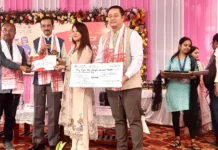[ Rhea Panicker & Indu Chukhu ]
GUWAHATI, 22 May: A pivotal workshop on “Safeguarding Women & Children from the Impact of Climate Change” was held here on Tuesday, bringing together a diverse group of experts, including senior lawyers, journalists, educators, researchers and NGOs. The event underscored the urgent need to address the vulnerabilities of women and children in the face of climate change, with a particular focus on the agriculture sector in the Northeast.
The workshop opened with an address by Sandeep Khaitan, co-chairman of the Associated Chambers of Commerce & Industry of India Northeast Council, who highlighted the disproportionate effects of climate change on women and children especially, in rural and agrarian communities.
Attending the event virtually, Dr. Soumya Swaminathan, chairperson of the MS Swaminathan Research Foundation (MSSRF) highlighted the case studies by NGOs and spoke about data gap in gender-based budgeting.
Dr. Rengalakshmi Raj, director of Ecotechnology at MSSRF, emphasized the critical need for gender-sensitive climate policies and interventions to ensure the protection and empowerment of these vulnerable groups. The importance of adopting a holistic perspective in this matter was also highlighted.
The workshop presented several other studies, such as the United Nations Framework Convention on Climate Change (UNFCCC) study of 2023, which stated that “women face higher risks and greater burdens from the impacts of climate change in situations of poverty and due to existing roles, responsibilities, and cultural norms.” According to the United Nations Development Programme, women and children are 14 times more likely than men to die in a disaster.
Presentations reflected the reasons why climate action needs to include women and children. Studies were presented proving that “when provided with the same access to resources as men, women can increase their agricultural yields by 20 to 30 percent.”
Independent consultant researcher Amit Mitra stated, “From the cradle to the grave, the people do not exist if bamboo does not.”
The core of the research presented at the workshop revolved around the ongoing impact of climate change on agriculture in the Northeast. The workshop also included a group discussion on women’s health, women’s livelihood, children’s health and education, and the psychosocial well-being of women and children in regard to the situation in the Northeast and its emerging issues.
An open discussion on how to take the recommendations of the report forward in the northeastern region, including what the focus areas should be, was also held.
Senior journalist and author from Manipur, Pradip Phanjoubam, pressed on the need for universal basic income, suggesting that labor should be redefined in the context of the presence of artificial intelligence.
Several state-specific issues were discussed with regards to women and children, pertaining to climate change. Some attendees suggested the creation of indices, such as a seed access index.

